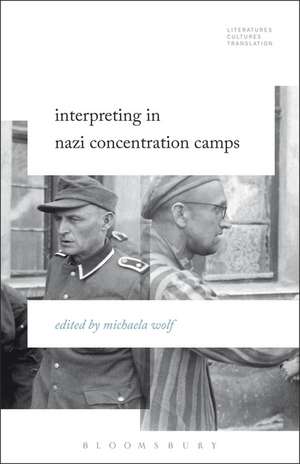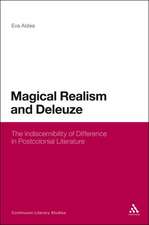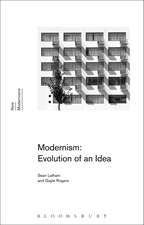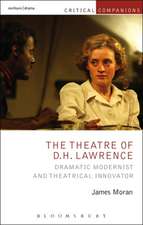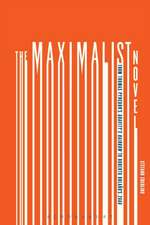Interpreting in Nazi Concentration Camps: Literatures, Cultures, Translation
Editat de Professor Michaela Wolfen Limba Engleză Paperback – 27 iul 2016
| Toate formatele și edițiile | Preț | Express |
|---|---|---|
| Paperback (1) | 237.28 lei 3-5 săpt. | |
| Bloomsbury Publishing – 27 iul 2016 | 237.28 lei 3-5 săpt. | |
| Hardback (1) | 830.62 lei 6-8 săpt. | |
| Bloomsbury Publishing – 27 iul 2016 | 830.62 lei 6-8 săpt. |
Preț: 237.28 lei
Preț vechi: 273.05 lei
-13% Nou
Puncte Express: 356
Preț estimativ în valută:
45.43€ • 47.22$ • 37.66£
45.43€ • 47.22$ • 37.66£
Carte disponibilă
Livrare economică 17-31 ianuarie 25
Preluare comenzi: 021 569.72.76
Specificații
ISBN-13: 9781501313257
ISBN-10: 1501313258
Pagini: 248
Dimensiuni: 140 x 216 x 28 mm
Greutate: 0.34 kg
Editura: Bloomsbury Publishing
Colecția Bloomsbury Academic
Seria Literatures, Cultures, Translation
Locul publicării:New York, United States
ISBN-10: 1501313258
Pagini: 248
Dimensiuni: 140 x 216 x 28 mm
Greutate: 0.34 kg
Editura: Bloomsbury Publishing
Colecția Bloomsbury Academic
Seria Literatures, Cultures, Translation
Locul publicării:New York, United States
Caracteristici
Opens up an innovative new area for study in both translation studies and Holocaust studies: communication in concentration camps
Notă biografică
Michaela Wolf is Associate Professor in the Department of Translation Studies at the University of Graz, Austria. Having published extensively in translation studies, her previous books include Framing the Interpreter (with Anxo Fernández Ocampo, 2014) and The Habsburg Monarchy's Many-Languaged Soul: Translating and Interpreting, 1848-1918 (2015). Between 2008-2012 she was co-editor of the journal Translation Studies (Routledge).
Cuprins
Contents List of FiguresNotes on Contributors Introduction Interpreting in Nazi Concentration Camps: Challenging the "Order of Terror"?Michaela Wolf, University of Graz, AustriaPART 1 The Concentration Camp UniverseChapter 1 The Camp Society: Approaches to Social Structure and Ordinary Life in Nazi Concentration CampsAlexander Prenninger, Ludwig Boltzmann Institute for Historical Social Research, AustriaChapter 2 Translanguagers and the Concentrationary UniverseDavid Gramling, University of Arizona, USAPART 2 Language Diversity in the CampsChapter 3 Linguistic Terror in Nazi Concentration Camps: Lucien and Gilbert - Portraits of Two "Interpreters"Heidi Aschenberg, University of Tübingen, Germany Chapter 4 Lagersprache through the Lens of Primo Levi's Essay on Translation: "Tradurre ed essere tradotti"Zaia Alexander, Berlin, Germany Chapter 5 On Translating and Being TranslatedPrimo LeviPART 3 Interpreting in the CampsChapter 6 "Someone whispered the translation in 100 languages, like a Babel.": Interpreting in the Mauthausen Concentration Camp Michaela Wolf, University of Graz, AustriaChapter 7 Interpreters in the Concentration Camp of Majdanek (1941-1944)Malgorzata Tryuk, University of Warsaw, PolandChapter 8 "Deaf Holocaust": Deaf Jews and their "True" Communication in Nazi Concentration CampsMark Zaurov, University of Hamburg, GermanyPART 4 Translating the Legacy of the HolocaustChapter 9 "L'écrit reste. L'écrit est une trace, tandis que les paroles s'envolent": On the Hermeneutics of Holocaust Survivor MemoirsPeter Kuon, University of Salzburg, AustriaChapter 10 The Ambiguous Task of the Interpreter in Lanzmann's Films Shoah and Sobibor: Between the Director and the Survivors of the Camps and Ghettos Francine Kaufmann, Bar Ilan University, IsraelChapter 11 The Illusion of "Authenticity": The Translation of Video Testimonies with Survivors of National Socialist Terror for Use in Educational WorkSylvia Degen, University of Aberystwyth, WalesPART 5 Limits of PermeabilityChapter 12 Interpreters in Soviet Prisoner-Of-War Camps: Beyond the "Unsayable"?Viktor Milosevic, University of Graz, AustriaChapter 13 Interpreting under Pressure: From Collaboration to ResistancePiotr Kuhiwczak, British Red CrossIndex
Recenzii
Interpreting in Nazi Concentration Camps is an outstanding contribution to the research of the role of interpreting and interpreters in situations of extreme violence. Based on a thorough examination of revealing primary sources... In sum, this book provides a much-needed study of the complex decisions interpreters have to make in situations of extreme pressure where survival is the ultimate-if not the only-concern.
In this book Michaela Wolf brings together pioneering essays by an outstanding group of scholars conducting pioneering research on interpreting encounters within Nazi Concentration Camps. The contributors offer many insights, from the psychological ramifications upon interpreters practicing under the most horrific of conditions, thru prisoners translating themselves into the German language and culture for pragmatic reasons, to some of the hidden and whispered multilingual communication among inmates necessary for survival. Wide-ranging and innovative, looking at both the interpreting work during the war and its post-war repercussions, this book is a must for all students and scholars of translation and interpreting, as well as those in history, ethics, communication, and Holocaust studies.
Michaela Wolf's excellent collection of carefully chosen essays adds greatly to our understanding of the always precarious and often ambiguous role of the concentration camp interpreter. The reader is able to gain new insights into the many practical and moral issues involved in interpreting between victims and perpetrators in this multilingual and extremely dangerous world. Anyone with an interest in the Holocaust or in the moral and ethical aspects of interpreting will want to read this book.
In this book Michaela Wolf brings together pioneering essays by an outstanding group of scholars conducting pioneering research on interpreting encounters within Nazi Concentration Camps. The contributors offer many insights, from the psychological ramifications upon interpreters practicing under the most horrific of conditions, thru prisoners translating themselves into the German language and culture for pragmatic reasons, to some of the hidden and whispered multilingual communication among inmates necessary for survival. Wide-ranging and innovative, looking at both the interpreting work during the war and its post-war repercussions, this book is a must for all students and scholars of translation and interpreting, as well as those in history, ethics, communication, and Holocaust studies.
Michaela Wolf's excellent collection of carefully chosen essays adds greatly to our understanding of the always precarious and often ambiguous role of the concentration camp interpreter. The reader is able to gain new insights into the many practical and moral issues involved in interpreting between victims and perpetrators in this multilingual and extremely dangerous world. Anyone with an interest in the Holocaust or in the moral and ethical aspects of interpreting will want to read this book.
